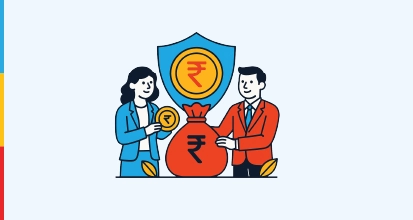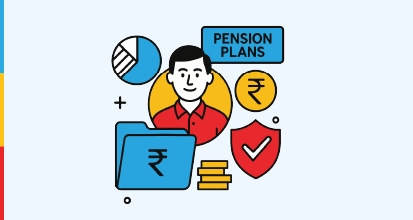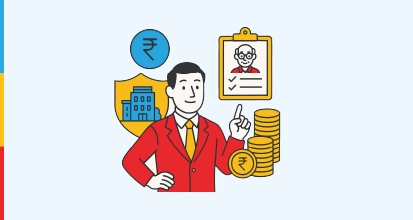Written by : Knowledge Centre Team
2025-11-10
5886 Views
6 minutes read
Share
Your professional life goes on with many ups and downs. At the end of your working life, you wish to relax and expect utmost financial security. You might be spending hours thinking about how to save for retirement. But the question arises “Whether your financial worries come to an end with your aggregate savings?” Certainly not.
There is a major aspect that eats up a huge chunk of your savings Tax. It feels disappointing while various taxes narrow down your hard-earned saving for retirement. Hence, you must work on tax-efficient financial planning so that to enjoy complete financial freedom after your retirement.
Your tax scenario may change a little after you retire, as your many long-term investments mature, and your investment preferences change. Apart from the regular pension, the following incomes may form a part of your taxable income:
Rental income can form a major part of your post-retirement income. For tax purposes, this income is classified as income from house property.
Rental income from house property increases your gross taxable income. The income tax will be charged as per the income tax slab.
Capital gains shall be taxable in the following cases:
Capital gains will be assessed based on the holding period of the asset and classified as long-term or short-term capital gain.
Here’s how these capital gains will be identified for taxation:
| Type of investment | Long term Asset | Tax Treatment on capital gains | Short term Asset | Tax Treatment on capital gains |
|---|---|---|---|---|
| Equity funds (Listed); Equity-oriented hybrid funds | More than 12 months | Taxable @ 10%, if more than Rs 1lakh | Less than 12 months | Taxable @ 15% |
| Equity funds (unlisted) | More than 36 months | Taxable @ 20% after indexation; 10% before indexation. | Less than 36 months | Taxable @ 15% |
| Debt funds and debt-oriented balanced funds | More than 36 months | Taxable @ 20% after indexation | Less than 36 months | Taxable @ 15% |
Indexation is a benefit based on the inflation rate in the country. Indexation allows a rebate on the capital gain for the inflation cost. Thus, indexation reduces your taxable capital gain amount.
The benefit of indexation is only available for LTCG. However, it is not available in the following cases:
Indexation adjusts the purchasing price of an investment in such a way that reflects the impact of inflation on it. The more the purchasing price of an investment, the lower will be the gains on it. Hence, lower will be the tax on it.
The inflation rate used for indexation can be obtained from the Cost Inflation Index (CII) table published by CBDT every year.
Here's the formula for calculating Indexed Cost of Acquisition (ICoA):
ICoA = Actual Cost of Acquisition x (CII of the year of sale / CII of year of purchase)
For example, you had invested Rs 10,000 in an equity fund in August 2019, at the NAV of Rs 10. You redeem your investment in FY 2021-22 at NAV of Rs 20/-, i.e., the value of the investment is Rs 20,000.
(The CII for FY 2021-22 is 317, and for FY 2019-20 is 289)
Now, ICoA = 10,000 X [317/ 289] = 10,969
Hence, after indexation, your capital gains shall be 9031 (20000-10969). 20% Tax shall be charged on this amount.
The tax rate for short-term capital gains from transfer of Equity Shares, Equity Oriented Funds shall be taxed at 15% u/s 111A of the Act.
Dividend and interest form a major part of your post-retirement income. Dividend and interest incomes from interest-bearing securities will be taxable as given below:
You have worked hard to increase your saving for retirement, but that’s not enough. Once you will retire and look at your savings corpus, you might feel satisfied that you have enough money for a happy life ahead. But wait, there is a huge percentage of taxes charged to it. A regular tax-free income is what you need the most after your retirement.
There are two ways you can reduce the burden of taxes on your retirement income:
Disclaimer - This article is issued in the general public interest and meant for general information purposes only. The views expressed in this blog are solely those of the writer and do not necessarily reflect the official policy or position of Canara HSBC Life Insurance Company Limited or any affiliated entity. We make no representations or warranties of any kind, express or implied, about the completeness, accuracy, reliability, suitability, or availability with respect to the blog or the information, products, services, or related graphics contained in the blog for any purpose. Any reliance you place on such information is therefore strictly at your own risk. You should consult with a qualified professional regarding your specific circumstances before taking any action based on the content provided herein.
We bring you a collection of popular Canara HSBC life insurance plans. Forget the dusty brochures and endless offline visits! Dive into the features of our top-selling online insurance plans and buy the one that meets your goals and requirements. You and your wallet will be thankful in the future as we brighten up your financial future with these plans.




